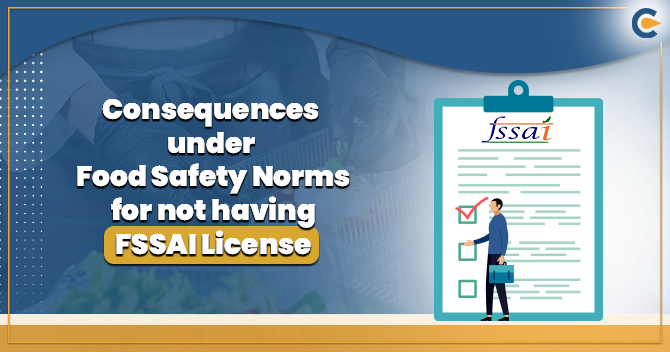Every food business operator should obtain FSSAI registration in India. It is compulsory compliance, which guarantees the safety of the foodstuffs. FSSAI is documentation issued by the Food Safety and Standards Authority of India to safeguard food safety in our country.
The Food Safety and Standards Act, 2006[1], is the organizational body for regulation of safety and standards of food Products in India. The manufacturer, buyers, sellers, restaurant owners, or any other food product related entity is required to acquire a 14-digit numbered license, which is required to be printed on the food products within their domain.
The need to acquire a Food License
The fact of obtaining a food license in India is to make sure the food products are being packed, sold, or traded by Food Business Operators are up to the quality standards or methods agreed by the FSSAI. The decisive goal of the Food Safety and Standards Authority of India is to diminish the odds of substandard products, food contamination and recover the accountability of manufacturers by allotting them with a food license for their food service.
Types of FSSAI registration
There are fundamentally three types of food license based on the average turnover of the Food Business Operator, and they are as follows-


Basic FSSAI Registration
FSSAI License is required by petty food business operators whose turnover does not exceed 12 lakhs per annum. Hawkers and vendors belong to this category.
FSSAI State License
FSSAI State License is for those food business operators whose turnover more than 12 lakhs and less than 20 crores annually.
Central FSSAI License
Central FSSAI License is for those business operators whose turnover is more than 20 crores and up to a specified limit prescribed by the law.
Entities that are required to obtain the Food License


What are Documents required for FSSAI Registration?
There are few essential documents that are required to get the FSSAI Registration. Those are given below categorically:-
Documents for Basic FSSAI Registration
- An ID proof that involves a photo proof
- Passport-sized photo
Documents for State & Central FSSAI License
- Address Proof
- Import/export registration
- Passport-sized photo
- List of directors
- List of Partners
- Certificate of incorporation of Food Business operator
- Memorandum of Association as well as Article of Association
- An identity proof that comprises of a photo
- No Objection Certificate from the concerned authority
Other Important Requirement
- Blueprint of the warehouse for manufacturing food products;
- List of all machinery required for manufacturing;
- Report on the test conducted on the water used for the manufacturing of food product
- List of all food categories the manufacturing sector is going to use;
What is the Procedure for FSSAI registration in India?
The registration procedure for FSSAI registration in India are as follow-
- The first step is to submit Form A application to food and safety department registered office.
- The application submitted to the department can either be accepted or rejected within 7 days from the date of filing. The reason for such rejection has to be provided by the concerned department.
- If the department accepts the application, then the food and safety department will grant the 14 digit license number with the photo identity.
- The food business operator is required to display the registration certificate provided by the food safety and standard department during their business hours.
The validity of FSSAI Registration in India
All food-related business operators must obtain and own a valid FSSAI Registration Certificate depending upon the type of food license, i.e., Basic FSSAI Registration, State License, and Central License. The validity is for one or five years as selected by the food business operator.
Read our article:What is National Food Security Card, and How to download it?
Consequences for Non-Compliance of FSSAI Registration in India
A registered person under the FSSAI has to fulfill the rules and regulations under the Food and Safety Standards Act, 2006. Food safety officer orders the scrutiny of the food business and identifies the level of compliance with the law using a checklist maintained by the FSSAI. Based on the compliances, the food safety officer states the compliance as:
- Compliance
- Non-compliance
- Partial compliance
- Not applicable
The food safety officer may be issued an enhancement notice according to Sec 32 of the Food Safety and Standard Act, 2006. If the food business operator fails to fulfill with the given notice, the officer has the authority to cancel the License. If the enhancement notice affronts any food business operator, then they can appeal to the State Commissioner of Food Safety. This decision can be challenged by filing an appeal in the Food safety appellate tribunal or high court of the respected state.
Penalty for Non-Compliance of FSSAI License
Numerous penalty for non-compliances of FSSAI License is given-
| Particulars | Fine Imposed |
| Quality of food not in compliance with the act | INR 2 lakhs For petty manufacturer-INR. 25,000/- |
| Sub-standard food | INR 5 lakhs |
| Non-branded food | INR 3 lakhs |
| Misleading advertisement | INR 10 lakhs |
| Irrelevant material in food | INR 1 lakh |
| Failure to comply with food safety officers course | INR 2 lakhs |
| Unhygienic processing and manufacturing | INR 1 lakh |
The requirement for renewal of the FSSAI License in India
Every food business operates underneath the rules and regulations defined under FSSAI Act 2006. Procurement of an FSSAI license is a must for every food business operator in India. However, the ordinary population doesn’t know that receiving FSSAI License renewal is equally essential as the attainment of an FSSAI license. It is vital to get FSSAI license renewal done within the stipulated period. If you work as an entrepreneur, you are required to obtain an FSSAI license along with a renewal license in every 1-5 years.
What are the Reasons for existence of FSSAI License?


Conclusion
With the view to improve the standard of food, the implementation of the Food Safety and Standard Act is accomplished by the Food Safety Commissioners of the state with food safety officers appointed in every state. Obtaining a Food License assures excellent quality of the food as well as improved quality. Now, people are very much conscious of the foodstuff they consume, whether they are up to the quality standard or not.
Read our article: An Elaborative Study: Food Safety and Management Systems











